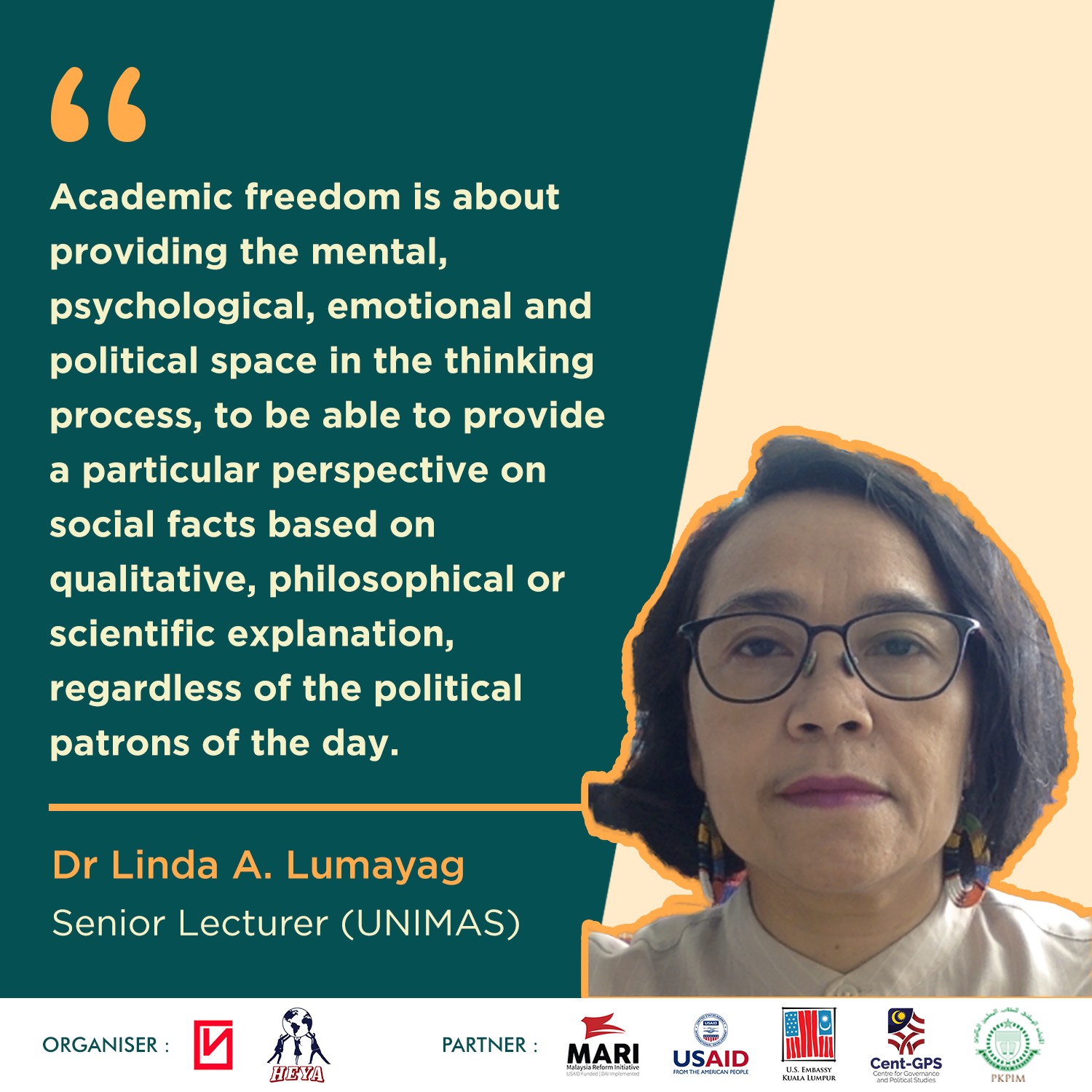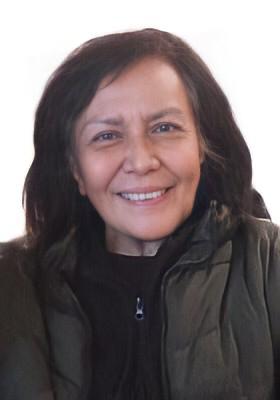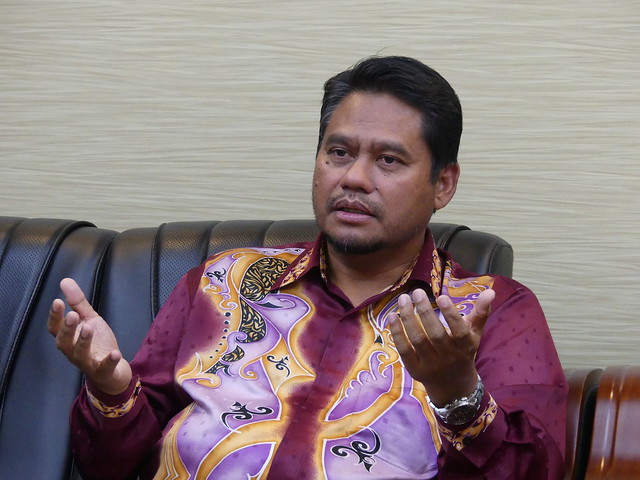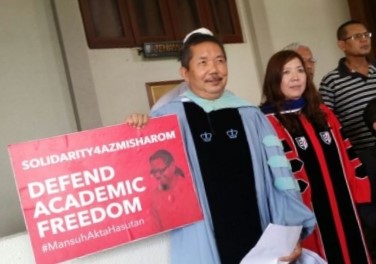AN INTERVIEW WITH DR LINDA LUMAYAG: THE IMPORTANCE OF ACADEMIC ECOSYSTEM IN ACADEMIC FREEDOM

In conjunction with our previous articles on the topic of AUKU and academic freedom, Naratif Malaysia recently interviewed Dr Linda Alfarero Lumayag, a Senior Lecturer and Programme Coordinator, Politics and Government Studies, at UNIMAS and a former member of KAMKEM-Alliance of Concerned Teachers Philippines (ACT). Contrary from previous articles with other scholars, Dr Linda Lumayag is a national of the Philippines. Hence, in this article, Dr Linda explains the importance of knowledge to be disseminated among society. She also shares her experience regarding academic freedom in Southeast Asia particularly comparing it during the implementation of Martial Law from Marcos’s years and AUKU in Malaysia.
NARATIF MALAYSIA (NM): Can we begin by asking you to summarize your involvement in academia?
LINDA LUMAYAG (LL): I was teaching for several years in my home country before I came to Malaysia. From the start, I have believed that the only way to develop society is through education. I am drawn to academia because of its deep sense of commitment to shape the minds of the young generation. And I do not see academia as a separate entity, devoid of any relationship to other societal institutions. Academia, to me, is the soul of the nation. It provides the moral and social compass that points to the concerns that governments need to address. I have had a meaningful experience joining progressive-thinking groups that seek to enlighten the vast majority of the academe who were apolitical and apathetic to the socio-political conditions of the time. As a member of then ACT (Alliance of Concerned Teachers Philippines), we organized meetings and orientations to keep academics abreast of national developments. These encounters were productive, although were not without their challenges to our own personal security and social mobility.
NM: How would you describe the state of academic freedom and university autonomy in Malaysia throughout your academic career? Maybe you can share specific instances from your own experience related to these two matters.
LL: I met a very young, passionate female university student who shared that after a semester in the university, she became more depressed and started to question how valuable the so-called ‘knowledge’ she learned before she entered the university. Her lecturer in Social History allowed students to explore “new” academic materials beyond what is required, then, she realized that all this while she was misled to understand a different version of ‘truth’.
The case above is one too many, I surmise.
If there is one institution that needs urgent reform, it is the state of our university education. It is truly a microcosm of the national frontier where the fabric of arrangement is ruled by the supremacy of race and religion. This seems to be the only major arrangement since the founding of Malaysia as a nation-state. The perception is that academia itself is not free from political control which is best demonstrated, for example, in the appointment of VCs, promotion exercises, vetting of curriculum structure and content, or quality of student intake. Since the ‘talent pool’ is restricted to those in the same race and political patronage, able academic leadership of public universities has become a challenge. The systemic process of depriving other capable leaders from the minority group to helm the public universities and its accessory issues of hiring and promotion has gravely affected quality teaching. A vicious cycle of a perceived worldview to serve a particular community rather than the greater majority remains unchallenged. A homogeneous prism through which we look at the academe has indirectly sidelined the interests and demand of the minority, as exemplified in the promotion exercise, textbook and course content etc. that then impacts teaching, research and management.
There is a strong invisible line of control that continues to pull down the sanctity of academic freedom and university autonomy. Academic freedom is beyond following the laborious task of doing documentation work, filling in forms and templates. This task does not configure in the overall movement to liberate our thinking from ignorance and miseducation. Nonetheless, academics have been reduced to complying these documentations, submitting them on time without substantive understanding how this task improve and strengthen knowledge production.
Academic freedom is about providing the mental, psychological, emotional and political space in the thinking process, to be able to provide a particular perspective on social facts based on qualitative, philosophical or scientific explanation, regardless of the political patrons of the day. An intelligent, pragmatic, evidence-based and pro-people presentation of everyday social reality only happens when academics are given the opportunity to provide a clear social analysis on issues on economy, medical science, astronomy or environment to the society. Without the ‘sacred space’ – the academic freedom to think, write and speak-, it would propel education that is alien and isolated to the everyday lives of the people, one that refuses to acknowledge the struggles, aspirations as well as the social inequality pervasive in society. In a way, academics propagate intergenerational miseducation. It is miseducation when academics sustain social inequality and discrimination by default – simply by refusing to put it in the knowledge production agenda.
NM: You received your Bachelor in 1985 (please correct me if I’m wrong), 14 years after AUKU was introduced in 1971. How was the academic freedom and culture during that time?
LL: My bachelor’s degree was obtained outside Malaysia in 1985. Right when AUKU was implemented in 1971, my country was also embroiled in a bitter struggle against the Marcos regime. In fact, Malaysia was ahead in implementing AUKU while in Philippines the then President Marcos declared Martial Law on September 1972, to fend off progressive movements including students and academics, peasants and farmers and others led by the progressive university students against the Marcos Government. At the same time, neighbouring countries like Thailand and Indonesia experienced a militant student movement aimed at challenging the dispensation at that time. Governments across the national boundaries were quick to justify repression based on the belief that communism will soon replace democracy as a form of government, hence the constricting forms of repression. Overall, the sociopolitical environment around this time was rather tense and critical as governments attempted to crush dissent and progressive thinking.
NM: Are there any differences in term of intellectual cultures and freedom between Malaysia and the Philippines? Are there any laws which similar to AUKU in the Philippines?
LL: The Southeast Asian region shares similar issues of repression on dissension and resistance. The difference lies in how best the respective state apparatus is able to clamp down different forms of dissent since, across societies, varied forms of struggles have been observed. Creativity, passion and limitless imagination were all we needed to launch a successful campaign against academic control. During the Marcos years, what stood out as a dangerous preoccupation was campus militarisation and campus violence which came with death and disappearances of student leaders and academics who were staunch anti-Marcos. The current Duterte dispensation is also described as violent and vindictive against those who are viewed as enemies of the state. Though the Martial Law decree has been abrogated, a new anti-people law in the form of ‘Anti-Terrorism Act 2020 was enacted in December 2020 in the middle of the global pandemic, that conveniently labels activists, human rights defenders and unionists as terrorists and communists.
NM: Conceptually, what is society? And to what extent should academics be involved in society? Should academics be concerned about all societal issues even if those issues raised are not relevant to their academic disciplines (field of study)?
LL: A society is simply not just an aggrupation of communities and groups that follows its own ‘flows and ebbs’ without a strong concerted effort to shape the people’s dreams and aspirations. Inherent in every society is the broader belief in the value of justice, fairness and happiness.
Firstly, I do not understand why there is a distinction between what is and what is not a relevant issue to other academic disciplines. I think for those who are drawing lines must rethink why they are in the academe in the first place. To me, it is all about the ability to establish the connection between what is observed outside the portals of the university and how the academia makes sense of it, or vice versa. In the realm of life, the flow of ideas is not confined within one’s academic discipline; the practice of constant thinking and critiquing is ideally a seamless process without looking at whether an issue is irrelevant to one’s academic calling. The academia is established to answer the clarion call to seek the truth, to search for knowledge to transform ignorance, to liberate society from ignorance. If we look at ancient societies, the process of ‘dialogue’, or in simple parlance, ‘the practice of talking’ transpires in a group who is interested in understanding and solving the problem/issue at hand. This collection of individuals who dares to challenge an existing belief or narrative engage in constant process of questioning the veracity of an idea by another and on and on. This process, at least to me, is a meaningful exchange of views and opinions and should not be seen as confined to the academic discipline. We tend to forget that the academia is here to serve as the ‘marketplace’ of ideas – ideas on how to transform ignorance to a knowledge society founded on an emancipated thinking, of fairness, and justice.
NM: You are involved with an association such as ALIRAN, community service, public lectures, journal articles and opinions, and research, in your opinion,
NM: Does the production of knowledge require academic freedom?
LL: Definitely. The process of knowledge production involves clear thinking, unimpeded by any form of surveillance and control. If the ecosystem does not provide this, the attitude towards it would be resignation, lethargy, complacency and apathy. There are risks, and I do acknowledge that. That is when academics must question themselves what and why are they there for in the first place. This should be clear from the very beginning.
NM: May legal constraints, such as AUKU, limit the actual function of academics? How?
LL: AUKU and other related laws that curtail individual liberty and freedom impact greatly on the functions of academics. If there is one social institution in the society that should be shielded from political control and the state of the market, it should be the education institution – primarily. Any Government of the day comes and goes so the vision and mission must take on the ideal plane rather than respond to the whims and fancy of the political leadership.
How legal constraints limit the function of academics are gleaned from the fact that they have become the psychological reminder at all junctures: from the preparation of teaching materials, sharing of progressive ideas in faculty meetings, questioning the wisdom of management decisions, planning student activities, and to writing research papers, and the list is long. As years go by, academics have become automatically their own self-censors. The culture of fear is pervasive in that it engenders a state of lethargy and it is palpable to the students (and parents). As such a situation continues, the cycle of lethargy remains unbroken.
NM: To wrap up, how do you see the future of higher education, especially for the younger generation of academics? Is there any room for improvement?
LL: There is so much that we can do, and I do not want to dwell on the negative. Because despite all the legal impediments against academic freedom, we remain hopeful that someone will pick up the cudgel, rise to the occasion and continue to empower others. Having said that, there must be a real legal and policy shift in the education system, i.e., one that centralizes meritocracy, inclusivity, hence, decentering race and religion, as the primary criterion. The supremacy of race and religion automatically produces a stifling of passion, indignifies capable academics who, in many ways, can actually present alternative views in light of the society’s challenges. Knowing that by taking the bull by its horn only put them in precarious situations is too much to bear as there is no tangible moral ecosystem that supports the alternative. Hence, the need to get academics organized.
It is also very critical to appoint dynamic and bold leadership to inject new blood into the system considering the leadership pool is limited and restricted.
To address intergenerational miseducation of the young, it is time to move forward a rigorous shift to meritocracy and a progressive, scientific, socially just and socially equitable education as foundation of Malaysia’s academic ecosystem. This foundation may be difficult to embrace if the academe continues to serve the political masters. Strategically, a comprehensive approach to tackle lethargy, incompetency (students, academics and university management) is the way to go by forging new alliances with the very stakeholders of the future of Malaysia.
*This interview is part of a research project (MAL 169 – After 50 Years of AUKU: The Role and Impact of AUKU’s Development on Academic Freedom in Malaysia) by Naratif Malaysia in collaboration with the Malaysia Reform Initiative (MARI), Higher Education Malaysia Association (HEYA), Cent-GPS and Persatuan Kebangsaan Pelajar Islam Malaysia (PKPIM). This interview has been lightly edited for length and clarity.



